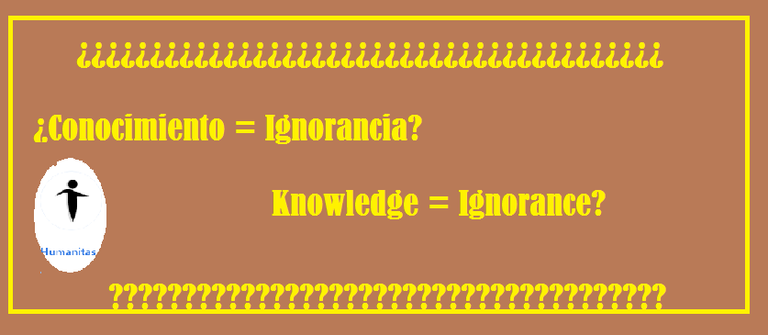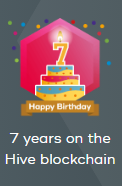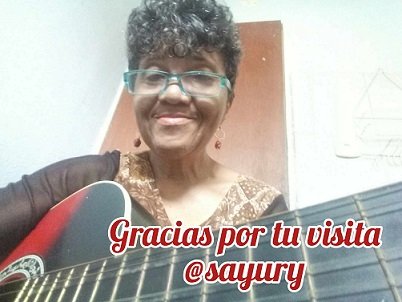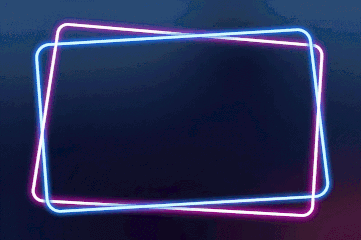¿Conocimiento = Ignorancia? / Knowledge = Ignorance? [Spa - Eng]

La frase "Sòlo se que no se nada" es atribuida a Sòcrates, un de los tres grandes filòsofos griegos de la antigüedad. La trìada de grandes filòsofos es complementada por Platòn y Aristòteles. La frase se encuentra precisamente en el diálogo de Platón "Apología de Sócrates".
Durante dècadas considerè esta frase un rasgo de humildad y modestia de parte del maestro, sin embargo, con el correr de los años me he dado cuenta que no era otra cosa que una gran verdad aplicable a todo ser humano.
Todos conocemos personas que tienen na actitud de "todo lo se" que nace - aparentemente - de su colecciòn de acreditaciones, magisters, doctorados, y otros. Pero analizar esto nos revela que mas allà de las acreditaciones que tengamos y de cuan reconocidos seamos por ellas "No sabemos nada".
Esto se puede demostrar en forma experimental: tomemos al mayor genio gastronòmico del mundo y sentèmoslo en la Nasa frente a una PC con el encargo de calcular con exactitud la trayectoria de un cohete que debiera salir de la Tierra y llegar a la luna. Volvamos en media hora... el gran cheff no habrà logrado nada al respecto.
Ah, pero ahora tomemos al mayor fìsico nuclear, super acreditado, el mejor del mundo, encerrèmosle en una cocina con todos los ingredientes - menos la receta...claro - con el encargo de que nos amase y hornee un simple pan. Regresemos en una hora. No habrà logrado nada.
Y es que son tantas las àreas de conocimiento, que una serie de diplomas solo acreditan de conocer un poquito en una àrea mientras que nos revelan de ignorantes en todas las otras. Entonces...a què tanta soberbia. Nuestra ignorancia siempre sobrepasarà a nuestro conocimiento.
Nuestro conocimiento en un área...revela nuestro desconocimiento de todas las otras. Y aùn revela solo un poquito de conocimiento en el àrea en que somos acreditados. Y ese mismo conocimiento... podrìa ser puesto en duda por muchas causas. Una de ellas es el hecho de que hay conocimientos que se reconocen como "inadecuados" con el correr del tiempo.
Tomemos un ejemplo claro: La Medicina. ¿Acaso los mèdicos de edades antiguas no aplicaban a sus enfermos sanguijuelas para que les "chuparan la sangre mala" y dejaran la buena y asì el enfermo sanarìa? Por no ir màs lejos...cuando yo era niña, los mèdicos mandaban curar las heridas pequeñas con "mercuriocromo", las màs importantes con "merthiolate" y cuando alguien tenìa fiebre la recomendaciòn mèdica era que se envolviera en una pesada cobija para que "sudara la fiebre". Ahora, tanto el mercuriocromo, como el merthiolate, los termòmetros de mercurio ¡Y pare usted de contar! Son proscritos de toda pràctica mèdica, y ante una fiebre alta los galenos mandan que se ayude al medicamento recetado manteniendo al enfermo en cama descubierto o tapado apenas con una sàbana ligera y mandan bañarlo. Hasta hace poco con agua frìa. Ahora estàn recomendando los baños con agua temeperatura "ambiente"
Entonces...por màs que sepamos de algo...serà solo una minimìsima parte del todo y quizà el tiempo nos traerà la sorpresa de que eso no es asì como lo aprendimos sino diferente o totalmente opuesto.
Tengamos esto presente y no miremos por encima del hombro a quien no sepa lo que sabemos nosotros, que el conocimiento puede ser relativo y seguramente esa otra persona sabe cosas que ignoramos.


The phrase "I only know that I know nothing" is attributed to Socrates, one of the three great Greek philosophers of antiquity. The triad of great philosophers is completed by Plato and Aristotle. The phrase is found precisely in Plato's dialogue "Apology of Socrates."
For decades, I considered this phrase a sign of humility and modesty on the part of the teacher; however, over the years, I have realized that it was nothing less than a great truth applicable to every human being.
We all know people who have a "know-it-all" attitude, seemingly born from their collection of credentials, master's degrees, doctorates, and others. But analyzing this reveals that, beyond the credentials we have and how recognized we are for them, "We know nothing."
This can be demonstrated experimentally: let's take the world's greatest culinary genius and sit him down at NASA in front of a PC, tasked with accurately calculating the trajectory of a rocket that is supposed to leave Earth and reach the moon. Come back in half an hour... the great chef won't have achieved anything.
Ah, but now let's take the greatest nuclear physicist, super-accredited, the best in the world, lock him in a kitchen with all the ingredients—except the recipe, of course—and task him with kneading and baking a simple loaf of bread. Come back in an hour. He won't have achieved anything.
And there are so many areas of knowledge that a series of diplomas only certify that we know a little in one area while revealing our ignorance in all the others. So...why so much arrogance? Our ignorance will always surpass our knowledge.
Our knowledge in one area...reveals our lack of knowledge in all the others. And it still reveals only a little knowledge in the area in which we are accredited. And that same knowledge...could be called into question for many reasons. One of them is the fact that some knowledge is recognized as "inadequate" over time.
Let's take a clear example: Medicine. Didn't doctors of ancient times apply leeches to their patients to "suck out the bad blood" and leave the good, thus healing the patient? To go no further... when I was a child, doctors prescribed treatment for minor wounds with "mercurychrome," for more serious wounds with "merthiolate," and when someone had a fever, the medical recommendation was to wrap themselves in a heavy blanket to "sweat out the fever." Now, both mercurochrome and merthiolate, mercury thermometers—and you stop counting!—are banned from all medical practice, and when a fever is high, doctors order the prescribed medication to be used by keeping the patient uncovered in bed or covered only with a light sheet, and they order a bath. Until recently, they used cold water. Now they're recommending baths with room temperature water.
So... no matter how much we know about something... it will only be a tiny part of the whole, and perhaps time will surprise us with the realization that this isn't how we learned it, but rather different or completely opposite.
Let's keep this in mind and not look down on anyone who doesn't know what we know. Knowledge can be relative, and that other person surely knows things we don't.


El texto fue creado sin utilizar IA
The text was created without using AI
▶️ 3Speak

Vote la-colmena for witness
By @ylich

o totalete opuesto.
